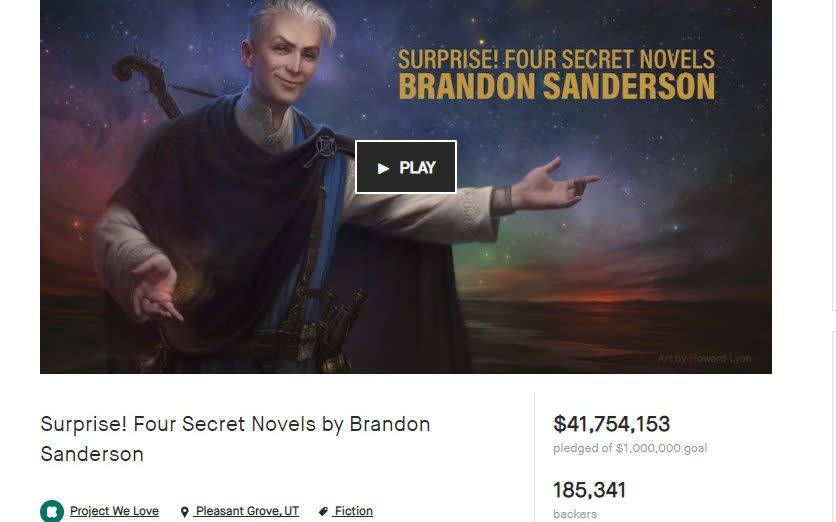This Mormon sci-fi author made $55m last year. So why isn’t he taken seriously?

From tipping the barman to pre-teen beauty pageants, America is no stranger to bizarre rituals. One of the weirdest is the glossy magazine “hit piece”. This involves a journalist pretending to be friends with a famous person and then demolishing them over 2,000 words or so. Make that 4,000 in the case of a new Wired magazine “profile” of fantasy author Brandon Sanderson, in which the best-selling writer is subjected to a thorough biffing-up.
“Maybe nobody writes about you…because you don’t write very well,” goes an early quote in the piece. The subtext – actually it’s just the text – is that Sanderson is a dreadful author and, worse yet, a nerd. We discover his readers are all nerds too when the magazine visits a Sanderson fan convention and laughs at attendees’ replica swords and the fact that they name their children after Sanderson’s characters.
Such unabashed vitriol will land oddly to non-American readers. Another early part of the piece reads: “He sits across from me in an empty restaurant, kind of lordly and sure of his insights, in a graphic T-shirt and ill-fitting blazer, which he says he wears because it makes him look professorial. It doesn’t. He isn’t. Unless the word means only: believing everything you say is worth saying. Sanderson talks a lot, but almost none of it is usable, quotable. I begin to think, This is what I drove all the way from San Francisco to the suburbs of Salt Lake City in the freezing-cold dead of winter for?”
If you dislike someone so much – as the US edition of Wired does – then why write about them at all? It can cause lasting damage too – the reputation of singer MIA never recovered from a vicious 2010 New York Times magazine profile in which she was upbraided for talking about social justice while scoffing truffle fries. Similarly, there was much hooting at Succession’s Jeremy Strong after he was tackled from behind by the New Yorker in December 2021. His crime? To take acting seriously.
In the case of Sanderson, the effect has been the opposite – at least judging by social media. Even readers lukewarm about his sprawling books have rallied to him following the pole-axing to which he was subjected by Wired. “He’s a wonderful bloke who has really earned the right to be a bit more respectfully written about,” tweeted Grimdark Magazine. “[The Wired piece] is repetitive, over-long, structurally messy and tonally all over the place. I’m not sure this is the guy to be judging another writer,” agreed fantasy author Justin Lee Anderson.
There's an article about Brandon Sanderson in Wired today, and the only thing I learned from it is that the author of said article is a total asshole. Is this really pretending to be good journalism?
— Brian McClellan (@BrianTMcClellan) March 23, 2023
That so many would rally to Sanderson is no surprise. He is the world’s most popular writer of escapist fiction and a widely acknowledged heir to Tolkien and George RR Martin. Also, his books are great fun.
They are huge and ever-expanding but always immensely bingeable. Take, for instance, his ongoing saga the Stormlight Archive: his action-packed version of the Lord of the Rings or George RR Martin’s A Song of Ice and Fire (from which Game of Thrones is adapted).
Stormlight is essentially Tolkien if Tolkien had grown up on Marvel. Early in the first book, there is a fantastic set-piece in which an assassin uses magic to switch gravity: he’s running along the side of a wall with a sword drawn, fighting guards at a 45-degree angle. The sequence is cinematic and thrilling. It left me needing a sit down afterwards – and I was seated to begin with. I’m not alone. Sanderson is a publishing juggernaut. He has sold 20 million novels across his career: Rhythm of War, the fourth volume of the Stormlight Archive, topped bestseller lists around the world when published late in 2020.
He has also “hacked” the publishing industry. The bulk of his book sales are via traditional retailers. However, Sanderson has a lucrative side-line self-publishing luxury limited editions via his imprint, Dragonsteel. In so doing, he has leveraged the power of fandom to a stellar degree. Last year, he crowd-funded four unpublished novels written during the lockdown for just over £33 million. Afterwards, he said he would use some of the revenue to purchase rare cards for the game Magic the Gathering, of which he is a fan.
Sanderson’s popularity has put a cross-hairs on his back. One popular target is his writing style – consciously clean and uncluttered so that the reader goes from a to b with minimum fuss. Wired went to lengths taking him to task for his prose, saying he uses too many adverbs and has a weakness and vulnerability for tautology.
These, of course, were the complaints against JK Rowling – another maniacal deployer of adverbs, it is alleged. And course, much the same was said of Stephen King across the decades. “The sentences he writes or the scenes he constructs are dull,” went an LA Review Of Books takedown of King in 2012. “My sense is that King appeals to the aggrieved adolescent, or the aggrieved nerdy adolescent.”

Those lines could have come from Wired in its attack on Sanderson. What’s odd about the hate is that it arrives at a time when fantasy has never been more widely accepted. Lord of the Rings is on Amazon Prime. House of the Dragon was a hit for HBO. The second season of Leigh Bardugo’s Shadow and Bone has just debuted on Netflix.
Bardugo, like Sanderson, is a cult author who has done well out of fantasy: she has just signed an “eight figure” deal with her publisher. And like Sanderson, she favours unadorned prose – the better to get out of the way of the story she is telling.
The difference is that nobody is writing hit pieces about her. They certainly aren’t accusing her of cultural appropriation for tapping Russian folklore in her work (her wizards are called “Grisha” – the Russian shortened form of Gregory). That’s in contrast to Sanderson, who has allegedly overstepped the mark by drawing on his Mormon faith in his writing. He has never denied this – and you have to wonder what the crime is. Lord of the Rings was steeped in Tolkien’s Catholicism. Philip Pullman’s His Dark Materials is infused with his take-no-prisoners atheism. Is Sanderson doing anything different?
The obvious conclusion is that being rich, middle-aged and Christian, Sanderson is an all-too-tempting target. In America, certain categories are still ripe for ridicule. They include poor white people and Mormons. Sanderson is a confessed nerd to boot – he loves Magic the Gathering and the video game Elden Ring. He also owns a home cinema where he and his family enjoy frequent screenings of The Greatest Showman. Put it all together and you end up with a hit piece by Condé Nast.
Sanderson has responded to the piece, saying that he doesn’t take the digs personally. He did, however, admit to déjà vu. “I’m worried about the way he treats our entire community. I understand that he didn’t just talk about me, but about you,” he said on Reddit. “As has been happening to fantasy fans for years, the general attitude of anyone writing about us is that we should be ashamed for enjoying what we enjoy. In that, the tone feels like it was written during the Eighties. “Look at these silly nerds, liking things! How dare they like things! Don’t they know the thing they like is dumb?””
Good on him for shrugging off the hate. And if the fallout from his pummeling in Wired has a positive it is that it might introduce more readers to his books. As Wired intimated, these novels won’t be mistaken for James Joyce or David Foster Wallace. They are, however, great fun. And isn’t that, in the end, what counts?


